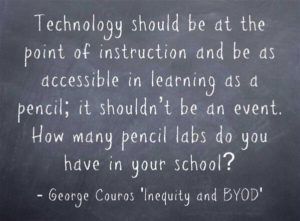
flickr photo by mrkrndvs shared under a Creative Commons (BY-SA) license
Whether we talk about digital skills, digital literacy or digital capabilities there is no doubt that students need to develop their use and understanding of digital tools (see Digital Skills for the UK Economy).
Don’t be misled by talk of the ‘digital native’ who by virtue of being born in the internet era has an innate understanding and ability to use technologies.
Just because students own smartphones and use social media to communicate with their friends doesn’t mean that they can use digital tools professionally, critically evaluate them and make informed decisions about online security, identity and digital wellbeing.
What are digital skills and why do we need them?
According to a recent report from the House of Commons Science and Technology Committee:
Digital skills have no single definition, but have been variously described to include a general ability to use existing computers and digital devices to access digital services, “digital authoring skills” such as coding and software engineering, and the ability to critically evaluate media and to make informed choices about content and information—“to navigate knowingly through the negative and positive elements of online activity and make informed choices about the content and services they use”.
Importantly they add that ‘These skills are no longer sector specific.’ Whatever graduate-level career our students go on to will expect digital literacy.
How can students develop digital capabilities at university?

flickr photo by Symo0 shared under a Creative Commons (BY-ND) license
The first recommendation to come out of the UK Government’s Digital Skills for the UK Economy Report (2016) is to ‘Ensure that digital skills are learned pervasively at all stages of education and training.’
These are not ‘add-on’ skills, but essential graduate attributes and as such they should be embedded in the curriculum.
Developing digital skills as part of a course can be achieved by ‘doing it digitally’ – it need not be about what students are learning but how they carry out their studies. Whatever students need to do they can probably ‘do it digitally’ to gain confidence and skills. What have you got planned for this term? Could you ‘do it digitally’?
Doing it digitally
Whatever your discipline there are likely to be aspects of study that could be done digitally such as note-making, managing resources, time management, presenting ideas and building a Personal Learning Network (PLN).
Over the past couple of years we have written several posts that offer suggestions:
- Digital tools for writing at university
- Clever apps for smart researchers
- Doing it digitally – Presentations
- Doing it digitally – Summer
- Reflective practice goes digital
- Get creative! Smartphones for learning
How can I learn more about ‘doing it digitally’?
Encouraging students to use digital technologies can be challenging if tutors are not themselves confident about using the tools. This autumn the TEL team will be running a number of staff workshops to help tutors gain the confidence with digital tools that will enable them to embed digital practice in their modules. These include:
- Learning by creating with smartphones
- Introduction to Poll Everywhere
- Reaching out to international students through technology
- Working together online
- Augmented reality and virtual reality in the classroom
- Engage learners using Twitter, Storify, Periscope and Vine
- Multimedia enhanced teaching and learning
- Run your own webinar with Adobe Connect
Read more and book online via the TEL website.
Sussex staff wanting to integrate digital skills into their modules can also contact their school learning technologist to discuss ideas.
For students keen to develop their digital skills TEL are running workshops during the Autumn term as part of Skills Hub. Topics to be covered are: Digital note-making and bookmarking; Digital tools for presentations; and Digital tools for time management.



[…] Read the full story by University of Sussex Technology Enhanced Learning Blog […]